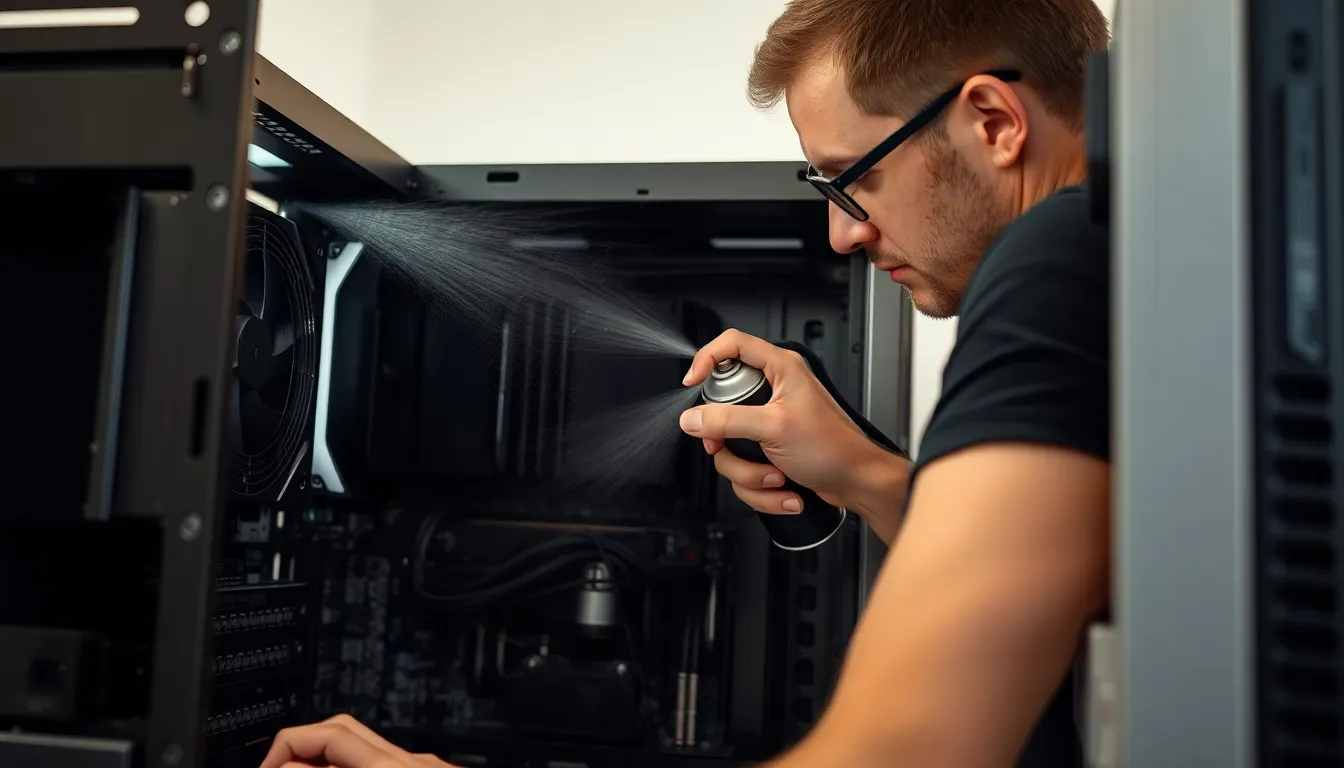In today’s tech-driven world, keeping a PC in top shape is more crucial than ever. Regular maintenance not only extends the lifespan of hardware but also enhances performance, ensuring that tasks run smoothly. Many users overlook this vital aspect, leading to potential issues that could have been easily prevented.
Understanding the essentials of PC hardware maintenance can save time and money in the long run. From dusting off components to monitoring temperatures, these simple practices can make a significant difference. By prioritizing maintenance, users can enjoy a reliable and efficient computing experience, free from unexpected disruptions.
Table of Contents
ToggleImportance Of PC Hardware Maintenance
PC hardware maintenance plays a crucial role in ensuring optimal performance and longevity of systems. Regular upkeep extends the lifespan of components, allowing users to maximize their investment in technology. Well-maintained hardware often operates at superior speeds, reducing the risk of performance bottlenecks.
Maintenance practices like cleaning dust from fans and components prevent overheating, a common issue that leads to hardware failure. Monitoring temperatures helps identify potential problems before they escalate, ensuring a more reliable user experience.
In addition, routine inspections lessen the chances of unexpected disruptions. Users can avoid costly repairs and downtime by proactively addressing issues. Commitment to hardware maintenance results in enhanced efficiency, ultimately fostering productivity in both personal and professional environments.
Common Hardware Issues

Common hardware issues can significantly impact a PC’s performance and longevity. Identifying and addressing these problems promptly prevents further complications.
Overheating Components
Overheating components present a critical concern for computer performance. High temperatures can lead to hardware failures, especially in CPUs and GPUs. Users should monitor temperatures using software tools, and if temperatures exceed safe limits, they must take action. Improving airflow in the case and replacing thermal paste can enhance cooling efficiency. Ensuring fans operate correctly and cleaning out dust build-up from heatsinks also aids in maintaining optimal temperatures.
Dust Accumulation
Dust accumulation can obstruct airflow and impede cooling performance. Regularly cleaning out dust from fans, filters, and components prevents overheating and extends the life of hardware. Using compressed air to blow dust out of fans and heatsinks keeps components clean. He regularly checking and cleaning the interior of the case promotes a more efficient cooling system, ensuring the PC runs smoothly.
Maintenance Practices
Regular maintenance practices enhance the performance and longevity of PC hardware. Implementing specific tasks consistently ensures optimal functionality and mitigates potential issues.
Regular Cleaning
Cleaning components regularly removes dust and debris that impede airflow and cooling efficiency. Users should focus on these critical areas:
- Fans: Dust accumulation can hinder performance. Clean fans every 1-3 months for optimal airflow.
- Heat Sinks: Debris on heat sinks affects heat dissipation. Inspect and clean every 3-6 months.
- Filters: Clogged filters obstruct air intake. Wash or replace them quarterly, depending on usage.
- Case Interior: Vacuum or use compressed air to clear dust from the case at least every 6 months.
Establishing a cleaning schedule prevents overheating and prolongs hardware life.
Component Upgrades
Upgrading components enhances performance and keeps systems current. Consider these vital upgrades:
- RAM: Increase RAM for improved multitasking and application performance. Upgrading to 16GB or 32GB can significantly boost efficiency.
- SSD: Transitioning from an HDD to an SSD improves boot times and application loading. Opt for at least a 256GB SSD for a noticeable difference.
- Graphics Card: Upgrading the GPU enhances gaming and multimedia experiences. Choosing newer models can provide substantial performance gains.
- Cooling Solutions: Install aftermarket cooling solutions to maintain lower temperatures during heavy usage. Liquid cooling can further improve thermal performance.
Timely upgrades maintain relevance in technology-driven environments, ensuring efficient hardware operation.
Tools For PC Hardware Maintenance
Regular maintenance requires specific tools that assist in effectively cleaning and diagnosing PC hardware components. Using the right tools contributes to a more efficient maintenance routine, leads to better performance, and extends the lifespan of the hardware.
Essential Cleaning Tools
- Microfiber Cloths: These prevent scratches while cleaning screens and surfaces.
- Compressed Air Cans: Effective for blasting away dust from crevices, fans, and heatsinks.
- Soft Brush: Ideal for gently removing debris from sensitive components without causing damage.
- Isopropyl Alcohol: Useful for cleaning contacts and surfaces; a concentration of 70% is commonly recommended.
- Anti-Static Wrist Strap: Protects components from static discharge during cleaning or upgrades.
- Vacuum Cleaner with Brush Attachment: Can remove dust from less accessible areas, ensuring thorough cleaning.
Diagnostic Software
- HWMonitor: Monitors hardware temperatures, voltages, and fan speeds, ensuring components run optimally.
- CPUID: Provides detailed information about the system’s hardware and real-time performance metrics.
- CrystalDiskInfo: Assesses the health of storage drives, alerting users to potential issues before failure.
- MemTest86: Tests RAM for errors, essential for maintaining reliable performance in memory-intensive tasks.
- Speccy: Offers insight into system specifications, making it easier to identify components that may need upgrades or maintenance.
Utilizing these tools ensures effective maintenance and enhances the overall performance of the PC.
Regular PC hardware maintenance is crucial for anyone looking to maximize their technology investment. By implementing simple practices like cleaning and monitoring temperatures, users can enhance performance and extend the lifespan of their components. Addressing common issues early on prevents costly repairs and ensures a smoother computing experience.
Utilizing the right tools and establishing a consistent maintenance routine can significantly improve efficiency. As technology continues to evolve, staying proactive about hardware upkeep not only safeguards performance but also fosters productivity in both personal and professional environments. Embracing these maintenance strategies will yield lasting benefits for any PC user.


